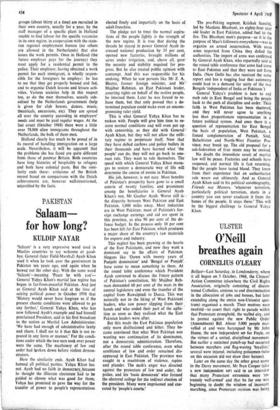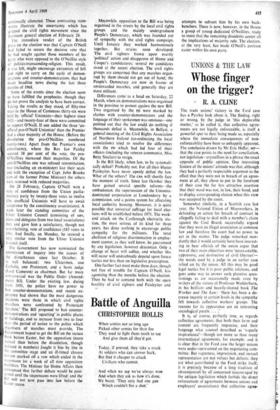O'Neill breathes again
ULSTER CORNELIUS O'LEARY
Belfast—Last Saturday, in Londonderry, where it all began on 5 October, 1968, the Citizens' Action Committee (elsewhere the Civil Rights Association, originally consisting of discon- tented Catholics, anxious to end discrimination in the allocation of jobs and houses, but later extending along the entire non-Unionist spec- trum) organised a march. Their motives were twofold—to assert their right to parade within that Protestant stronghold, the walled city, and to protest against the new Public 'Order (Amendment) Bill. About 5,000 people mar- velled at and were harangued by Mr John Hume, the new independent MP for Foyle, on the virtues of a united, disciplined movement. But earlier a sustained punch-up had occurred between marchers and flag-waving 'loyalists,' several were injured, including policemen (who on this occasion did not draw their batons).
Later on the same day the other great name in the Derry movement, Mr Ivan Cooper (also a new independent Ml') said in an interview That many Protestant extremists were 'ex- tremely well-armed' and that he for one was beginning to doubt the wisdom of incessant marching, since Protestant opinion was being
continually alienated. These contrasting state- ments illustrate the uncertainty which has gripped the civil rights movement since the Stormont general election of February 24. 'the immediate verdict of the British press on the election was that Captain O'Neill had failed to secure the decisive vote that he had sought against those members of his party who were opposed to the O'Neillite style of politics-transcending-religion. This result, it was felt, might encourage extremists of left and right to carry on the cycle of demon- strations and counter-demonstrations that had made headline news during the last three months of 1968.
Some of the events since the election seem to have fulfilled the prophecies, though they do not prove the analysis to have been correct.
Taking the results as they stood, of fifty,two seats in the House of Commons thirty-six were held by 'official' Unionists—their highest since 192I—and twenty-four of these were committed to support O'Neill. If one added the three 'un- official pro-O'Neill Unionists' then the Premier had a clear majority of the House. (Before the
dissolution the pro-O'Neillites numbered twenty-two.) Apart from the Premier's own
constituency, where the Rev Ian Paisley secured 38 per cent of the vote, the pro- O'Neillites increased their majorities. Of the anti-O'Neillites one was refused renomination, two (including an ex-minister) lost their seats • and with the exception of Capt. John Brooke Non of the former Prime Minister) the others
ere returned with reduced majorities.
On 28 February, Captain O'Neill won a vote of confidence from the Union parlia-
mentary party by twenty-three votes to twelve (the unofficial Unionists will have to await acceptance by the constituency associations). A week later the standing committee of the
Ulster Unionist Council (consisting of MPS, peers and delegates from two local associations)
met, and gave him a satisfactory, though not overwhelming, vote of confidence (183 votes to 116). And finally, on Monday, he secured a very similar vote from the Ulster Unionist Council itself.
The Government has now nominated the commission of inquiry into the causes of the disturbances since last October. It is well balanced: two Ulstermen, one Catholic, one Protestant, and a Scots judge (Lord Cameron) as chairman. But far more controversial was the Public Order (Amend- ment) Bill. Under the existing law, dating from 1951, the police have no power to ban counter-demonstrations, and recent ex- perience had shown that the most dangerous incidents were thok in which civil rights
marchers were confronted by Protestant 'loyalists,' The Bill proposed to ban counter- demonstrations and `squatting' in public places or buildings, and to increase from two to four da■s the period of notice to the police which organisers of marches must provide. The Go% ernment hoped to get the Bill on the statute book before Easter, but the opposition (more radical than before the dissolution, though reduced in numbers) fought it line by line in the committee stage and an ill-timed closure motion sparked off a row which ended in the suspension for a week of all nine opposition ruetnbers. The Minister for Honk Affairs then announced that further debate would be post- poned until the suspensions were lifted: and the Bill will not now pass into law before the Easter recess.
Meanwhile, opposition to the Bill was being organised in the streets by the local civil rights groups and the mainly undergraduate People's Democracy, which was founded out of sympathy with the civil rights campaign.
Until January they worked harmoniously together. But strains soon developed. The civil righters frown upon overtly 'political' action and disapprove of Hume and Cooper's candidatures; several PD candidates
stood at the recent election. The civil rights groups are concerned that any marches organ- isqd by them-should not get out of hand; the People's Democracy are now in favour of unstewarded marches, and generally they are more militant.
Differences came to a head on Saturday, 22 March, when six demonstrations were organised in the province to protest against the new Bill.
Two organised by the were marked by clashes with counter-demonstrators and the language of their spokesmen was ominous—one pointed out that the law could do nothing if thousands defied it. Meanwhile, in Belfast, a general meeting of the Civil Rights Association of Northern Ireland (co-ordinating the local associations) tried to resolve the differences with the PD which had led four of their officers (including the veteran communist, Miss Betty Sinclair) to resign.
Is the Bill likely, when law, to be systemati- cally defied? Probably not. For all their bluster Paisleyites have never openly defied the law. What of the others? The CRA will shortly face the moment of truth. Since last October they have gained several specific reforms—the ombudsman, the supersession of the Unionist- dominated corporation at Londonderry by a commission, and a points system for allocating local authority housing. Moreover, it is quite possible that universal suffrage for local elec- tions will be established before 1971. The week- end attack on the Castlereagh electricity sta- tion, the most serious of its kind for three years, has done nothing to encourage public sympathy for the militants. The total abolition of religious discrimination in employ- ment cannot, as they well know, be guaranteed by any legislation, however draconian. Only a change of heart will suffice, and whether this will occur will undoubtedly depend upon future tactics not less than on legislative prescription.
One further fact must make these days, though not free of trouble for Captain O'Neill, less agonising than the months before the election. Then he had to contend both with the open hostility of civil righters and Paisleyites and attempts to subvert him by his own back- benchers. There is now, however, in the House a group of young dedicated O'Neillites, ready to insist that the remaining dissidents accept all the implications of majority rule. The election, at the very least, has made O'Neill's position easier within his own party.



































 Previous page
Previous page